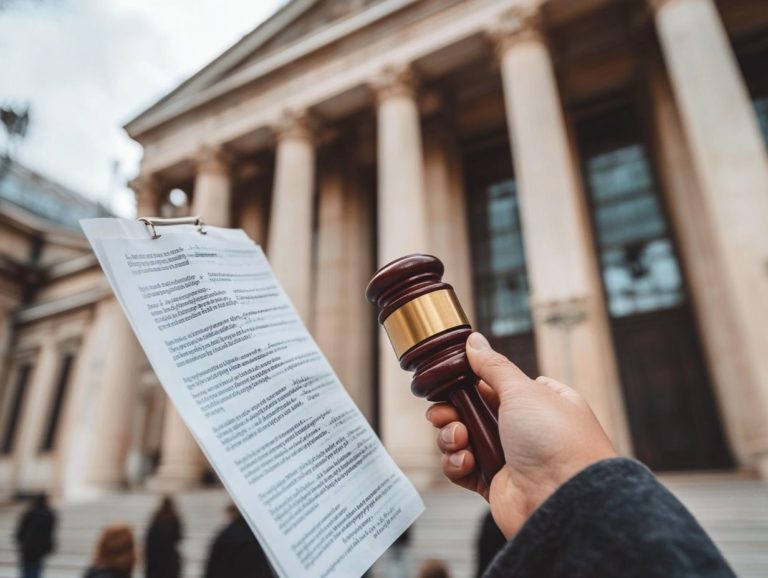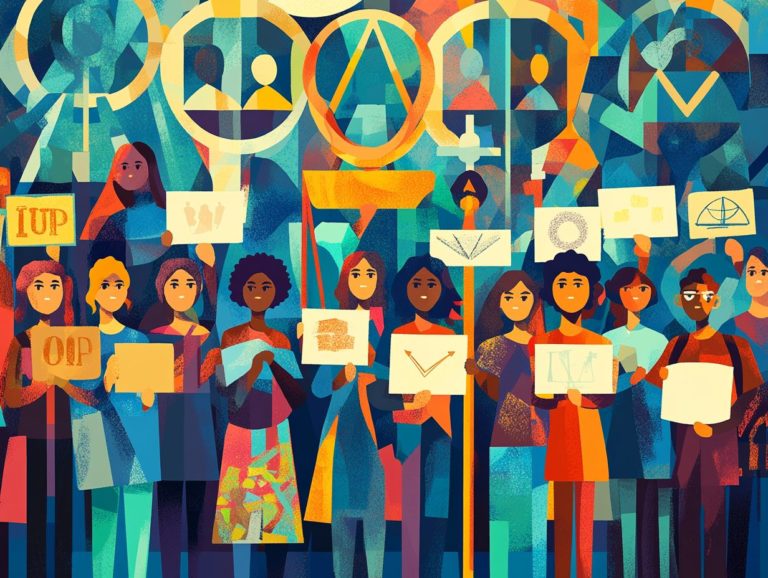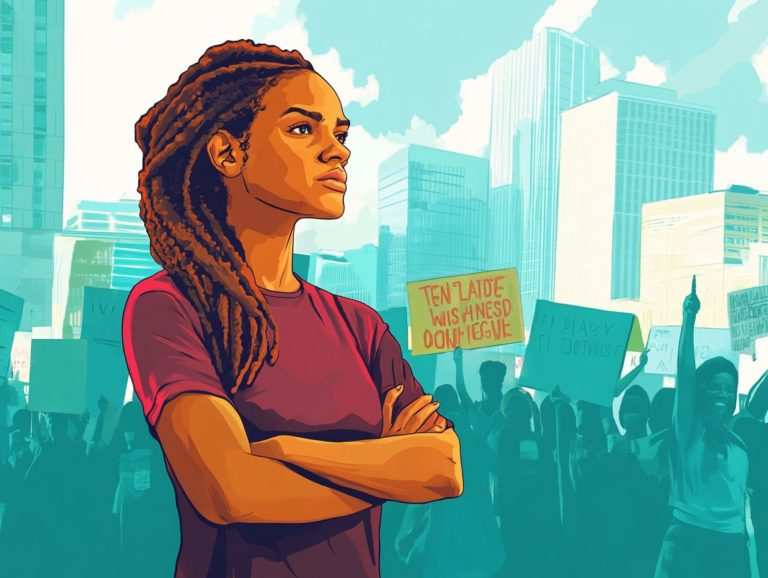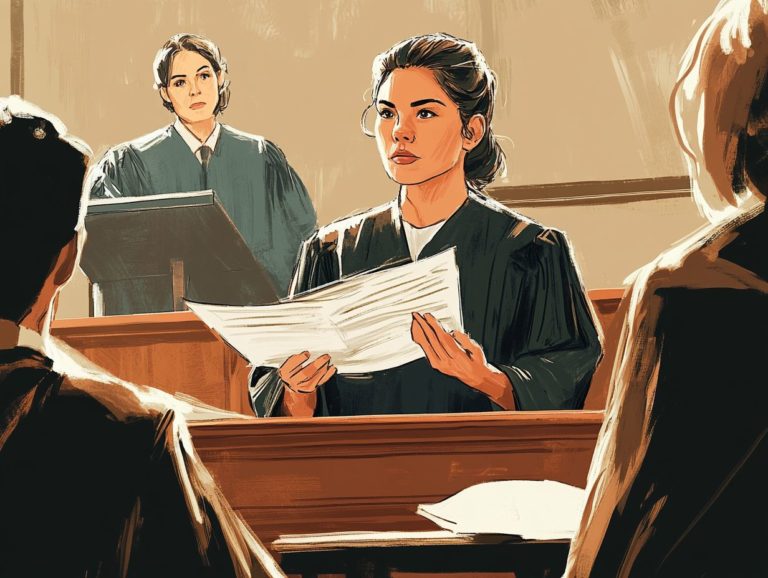How to Prepare for Your Rights Discussion
Understanding your rights is vital for navigating legal matters and daily life.
This article is your roadmap. It guides you through essential steps to prepare for a discussion about your rights, explaining what they are and why it’s crucial to be informed.
You ll discover how to pinpoint the purpose of your conversation and conduct thorough research. You will also learn to clearly articulate your questions and concerns.
With strategies for active listening and clear communication at your fingertips, you ll feel empowered to engage confidently in discussions about your rights.
Contents
Key Takeaways:

Knowing your rights empowers you to protect yourself and understand your legal standing! Researching your rights and the purpose of the discussion can help you prepare informed questions and concerns.
Effective communication, such as active listening and being assertive, can ensure a productive and respectful rights discussion.
Understanding Your Rights
Understanding your rights is essential for upholding human dignity and ensuring justice within society.
Human rights are basic rights that everyone has. Civil rights protect individuals from unfair treatment.
In the realm of the U.S. Constitution, human rights include fundamental and civil rights that shield individuals from discrimination and abuse. These rights transcend mere legal definitions; they embody moral assertions that affirm your inherent worth and dignity.
They play a crucial role in safeguarding both social and legal rights, offering a vital framework for rights protection that is essential in any thriving democratic society.
What Are Your Rights?
Your rights encompass a broad and vital spectrum of protections, including human rights, civil rights, and legal rights, all meticulously outlined in the U.S. Constitution and various laws.
Voting rights serve as a cornerstone of democracy. They ensure that every eligible citizen can engage in the electoral process free from discrimination.
Disability rights champion equal access and inclusion, enabling individuals with disabilities to fully participate in societal activities.
Reproductive laws, too, play a crucial role. They safeguard personal autonomy and health choices that resonate with broader human rights principles.
Together, these components underscore the interconnected nature of rights. They illustrate how the pursuit of equity in one domain can profoundly impact progress in others.
Why is it Important to Know Your Rights?
Understanding your rights is essential for advocating for yourself and others.
When you remain unaware of these rights, you risk encountering significant violations don’t let that happen! This lack of knowledge not only jeopardizes your own dignity but also diminishes the collective voice that strives for justice and equality.
By educating yourself about economic rights and the moral principles that underpin these fundamental freedoms, you enable not just yourself but also those around you to confront injustices. This enablement is vital, not only for your personal growth but also for fostering a more equitable society where every individual’s rights are respected and upheld.
Identifying the Purpose of the Discussion
The aim of this discussion is to shed light on the crucial role that human rights and civil rights play within society.
It delves into the mechanisms that protect these rights and emphasizes the significance of international legislation in safeguarding these fundamental freedoms.
Why is This Discussion Happening?

The discussion arises from urgent issues like digital discrimination, immigration status, DACA, and reproductive laws.
These topics highlight systemic inequalities in society linked to race, gender, and economic disparity.
Recent legal changes impact marginalized communities. This raises critical questions about who benefits from current policies.
As challenges unfold, it s crucial to push for reforms that protect rights and promote equity for everyone.
This dialogue stresses our shared responsibility in building a just society.
What Are the Goals?
The goals are to raise awareness of human rights violations, push for stronger protections, and support social rights for marginalized communities.
This discussion seeks to create a framework for police rights and necessary reforms in legislation.
Addressing these issues can help build an environment where law enforcement is treated fairly and accountability is ensured.
Your efforts can lead to a more equitable society by bridging gaps between communities and police.
Researching Your Rights
Researching your rights is crucial for understanding your protections under human rights and legal frameworks, including the U.S. Constitution.
Knowing these protections helps you navigate legal situations with confidence and clarity.
Where to Find Information
You can find valuable information about your rights in the U.S. Constitution, government websites, legal aid organizations, and international legislation.
For clarity on your legal rights, explore databases like Westlaw or LexisNexis for in-depth analyses and case law.
Human rights organizations, like the ACLU and Human Rights Watch, advocate for individual rights and provide updates on legislation.
Educational institutions often offer workshops and free seminars to clarify legal protections. Engaging with these resources enhances your awareness.
How to Interpret Legal Language
Understanding legal language is essential for knowing your rights under human rights conventions and the U.S. Constitution.
While legal terms may seem daunting, grasping them is vital for advocating for yourself.
Techniques like simplifying legal jargon or using visuals can boost your comprehension. This way, you empower yourself and contribute to a society where justice and equality thrive.
Preparing Questions and Concerns

Preparing questions about your human rights is critical for addressing potential violations. This is vital in civil rights, reproductive laws, and digital discrimination.
Being informed allows you to advocate for yourself in these important discussions.
What Do You Need Clarification On?
Identifying the areas where you seek clarification is essential for grasping your rights, particularly those fundamental human and civil rights enshrined in the U.S. Constitution.
You may often find yourself grappling with specific provisions, like your right to free speech within educational settings or the protections against discriminatory practices in schools.
For instance, consider how students might feel uncertain about their ability to voice opinions on controversial subjects without fear of repercussions. Comprehending these rights is crucial, as education lays the groundwork for civic engagement and personal growth.
By taking the time to reflect on these aspects, you enable yourself to advocate for both your own rights and those of others. This ensures that your educational journey is not only enriching but also honors your unique rights.
What Are Your Concerns?
Expressing your concerns about human rights or civil rights issues is crucial for effective advocacy and the protection of rights, especially regarding social rights and reproductive laws.
When you engage in these discussions, it s important to create a clear framework that fosters open dialogue and constructive criticism. You should feel enabled to share your experiences and observations; doing so not only brings specific issues to light but also cultivates a deeper understanding of how rights violations can affect communities.
By discussing the economic rights tied to social services and personal autonomy, you craft a more comprehensive approach to advocacy. Your active participation in these conversations helps build a collaborative atmosphere that champions justice and equality for all.
Practicing Effective Communication
Effective communication is vital when advocating for human and civil rights. It enhances your ability to articulate issues with clarity and confidence while also incorporating active listening techniques to ensure a comprehensive understanding of diverse perspectives.
Active Listening Techniques
Active listening techniques are vital for grasping the concerns of those who advocate for human rights and civil rights. These techniques pave the way for meaningful dialogue and the protection of those rights.
By employing strategies such as paraphrasing, asking open-ended questions, and reflecting feelings, you can create an environment where advocates truly feel heard and valued. This approach fosters trust and encourages deeper discussions about the critical issues at hand.
Effective communication grounded in these techniques can amplify voices that are often marginalized, ensuring that the perspectives shared during conversations are given the attention they deserve.
These practices can serve as a catalyst for action, as understanding the nuances of advocates’ concerns can inform strategies and initiatives aimed at promoting human rights in a more impactful way.
Assertive Communication Strategies

Assertive communication strategies enable you to effectively express your thoughts and concerns about human rights and civil rights, boosting the protection of these rights.
By employing techniques like “I” statements to share your personal experiences and feelings, you can articulate your viewpoints without casting blame. For instance, rather than saying, “You don’t care about our community’s issues,” you might choose to express, “I feel unheard when our concerns are overlooked.”
Active listening is crucial in assertive communication. When advocating for social rights, showing understanding and empathy towards others’ experiences not only builds bridges but also fosters constructive dialogue.
These strategies contribute to your personal enablement and galvanize collective action against civil rights violations.
Frequently Asked Questions
How do I prepare for a rights discussion?
To prepare for a rights discussion, research your rights and understand the laws and regulations that pertain to your situation. Gather any relevant documents or evidence that support your case. Additionally, it may be helpful to practice your arguments and responses to potential questions that may arise during the discussion.
What should I bring to a rights discussion?
Bring any documentation that supports your case, such as contracts, emails, and receipts. Don’t forget a pen and paper to jot down notes!
How should I approach a rights discussion?
Stay calm and professional. Clearly and confidently present your case while listening to the other party’s points.
What are some common mistakes to avoid during a rights discussion?
Avoid getting emotional or defensive. Making threats can derail the discussion and hurt your case.
Don t make false claims or exaggerate; this will damage your credibility.
Do I need to hire a lawyer for a rights discussion?
You might not need a lawyer, but having one can be helpful if things get complicated. A lawyer can guide you and protect your rights.
What should I do after a rights discussion?
Think carefully about the outcome and any agreements reached. Follow up if further actions or documents are needed.
Consider what went well and what could improve future discussions.






